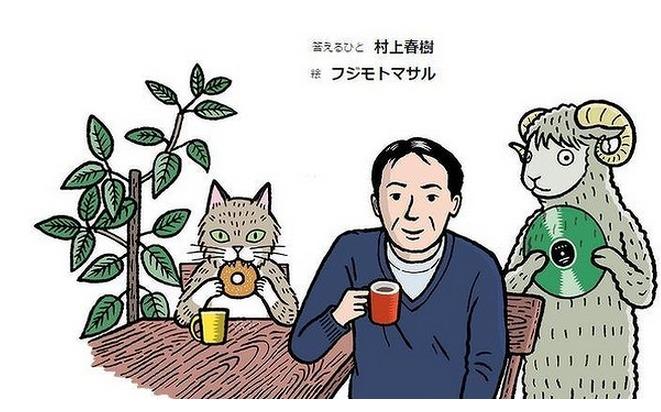First published in Daily Life March 2015
Last month, Haruki Murakami pulled off what may be his strangest-ever plot twist without resorting to a single brooding protagonist, sewer-dwelling monster or disappearing cat. In January 2015, the reclusive Japanese novelist, who commands a fan base frenzied enough to queue outside bookstores at midnight, relinquished the authorial mystique that’s helped make his career to launch ‘Mr Murakami’s Place’, a temporary website where he solves his readers’ dilemmas via an online advice column.
“‘Adult’ is nothing more than an empty form,” he reassures a woman paralysed at the idea of turning 30; “In the bed with someone I love,” he tells a student curious about the place he spends the most time; and “I suspect that either you or your cat is very sensitive,” he warns a girl whose feline scampers away every time she cries. The responses are less a study in Murakami’s trademark mix of oddness and economy than they are a series of clues about the confusing business of everyday living – in all its banal and heartbreaking glory.
But the Nobel favourite can’t take credit for recognising the literary value in dishing up advice. In the last few years, the schoolmarmish figures that once haunted women’s magazines have given way to a new kind of agony aunt that swaps finger-wagging missives designed to police female behaviour for responses that weave stories of personal failure with insights that address conflicting truths.
From ‘Dear Sugar’, a cult The Rumpus advice column that showcases Cheryl Strayed’s talent for turning promiscuity into poetry, to ‘Savage Love’, gay activist Dan Savage’s attempt at questioning sexual norms, to The Cut‘s ‘Ask Polly’, where Heather Havrilesky draws from her past as a beer-swilling ingrate to inspire readers to take charge of their lives, these modern-day advice columnists are an Internet-era corrective to a world where we google our heartbreaks and air career problems on Reddit – even if the decisions we face are more complex than ever.
Luckily, the agony aunt’s history offers sweet relief for those who long for simpler times.
Although London’s Athenian Mercury published the first-ever advice column in 1693, it was sister paper The Ladies Mercury, home of ‘Love, Etc’ – a section that promised to help 17th century women solve relationship dramas and brush up their etiquette while preserving the “Zeal and Softness becoming to the Sex” – that truly cemented the genre. In the 1950s and 1960s, Ladies Home Journal, whose famous advice column ‘Can This Marriage Be Saved?’ urged its middle-class, educated readers to abstain from “cooking hash for dinner” and “padlock [their] tongues” until it was stormed by feminists in 1970, took up this mission with aplomb. And ‘Dear Abby’, Pauline Esther Phillips’ much-loved newspaper feature, might have dropped its no-divorce stance when women’s liberation kicked in but it still casts the agony aunt as the sage gatekeeper of female-specific wisdom that assumes there’s only one way to be a woman.
As Lily Roth points out in a February 2013 article in The Atlantic, “Though a lot changed between those medieval how-tos and the first letter to Dear Abby, the basic point remained the same. This, the columnists told us, is how a good woman would act.”
Matt Petonzia believes that openness rather than prescriptiveness is at the heart of the modern-day agony aunt’s appeal. “Today’s columnists aren’t trying to be experts; in fact, they’re transparent about their flaws. At the end of the day, that might be their greatest qualification,” he writes in a January 2015 article in Mashable.
Savage draws on his history of being bullied to help his audience combat homophobia, Heather Havrilesky uses her own past romantic delusions to motivate readers to leave unhealthy relationships, and Cheryl Strayed – despite her fondness for terms such as “sweatpea” and “tortured rising star glowbug” – offers her fans glittering insights by recounting experiences like heroin use and assault with bravery and grace. For the modern-day agony aunt, vulnerability is the antidote to sexist platitudes and women’s problems aren’t partial or specific – they’re just part of the messiness of being alive.
In “Write Like a Motherfucker,” a 2010 ‘Dear Sugar’ column that’s since been immortalised on thousands of coffee cups, Cheryl Strayed offers advice to Elisa Bassist, a struggling writer who believes she writes like a girl. “How many women wrote beautiful novels and stories and poems and essays and plays and scripts and songs in spite of all the crap they endured. How many of them didn’t collapse in a heap of ‘I could have been better than this’ and instead went right ahead and became better than anyone would have predicted or allowed them to be,” she says.
Women are still subject to the patronising whims of pop psychology but the modern-day agony aunt suggests that the weaknesses we’re regularly chastised for might actually be our strengths. It’s the kind of strange plot twist that’s out of something by Murakami.
